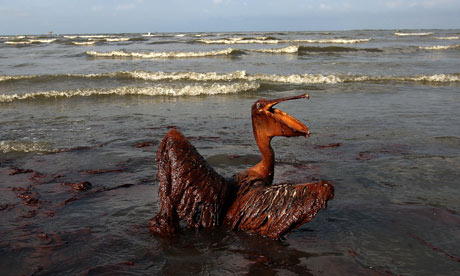
BP is apparently doing quite well a year after the Deepwater Horizon rig exploded a mile above its blown-out well off the coast of Lousiana, spilling at least 5 million barrels of light crude and a huge amount of methane into the Gulf of Mexico.
NEW ORLEANS – It's hard to tell that just a year ago BP was reeling from financial havoc and an American public out for blood. The oil giant at the center of one of the world's biggest environmental crises is making strong profits again, its stock has largely rebounded, and it is paying dividends to shareholders once more. It is also pursuing new ventures from the Arctic to India. It is even angling to explore again in the deep waters of the Gulf of Mexico, where it holds more leases than any competitor.
-Associated Press
Unfortunately, Gulf residents are not doing so well. In addition to the fact that Gulf fishermen are struggling to make a living in the now-polluted waters, workers who cleaned up the spill are suffering from a variety of otherwise unexplained illnesses.
"They told me it (the chemical dispersants used by BP) was just as safe as Dawn dishwashing liquid and there was nothing for me to worry about."
-Gulf resident Jamie Simon

The toxic spewing lasted for 87 days, and made for great internet viewing. Experts are divided over where all the oil went. Did it just naturally disperse/get eaten up, or is it still lurking on the sea floor?
The discovery of oil on the seafloor also begins to account for the 23 percent of the oil that was not recovered directly, dispersed chemically or naturally, evaporated or dissolved, burned or skimmed, according to a report released Nov. 23 by the National Oceanic and Atmospheric Administration.
-Cosmic Log
Samantha Joye, the outspoken University of Georgia scientist who first discovered the massive underwater plumes of oil that BP and US government officials have repeatedly denied the existence of, continues the work of searching for the truth despite intense backlash.
"I think it is not beyond the imagination that 50% of the oil is still floating around out there."
-Samantha Joye

